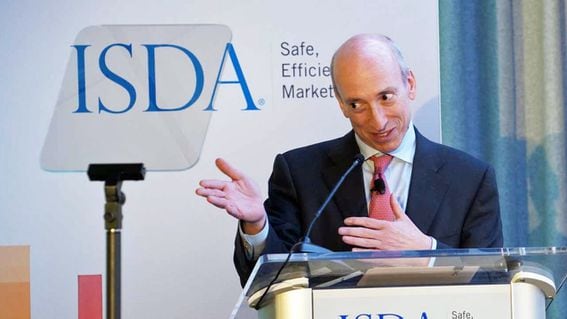
- Ethereum checked the necessary box for an exchange traded fund after having traded as futures on the Chicago Mercantile Exchange for years, Gary Gensler told CNBC on Wednesday.
- The SEC chair remained vague about exactly when the industry may see the next major crypto token wrapped in ETFs.
The approval of new exchange traded funds (ETFs) for Ethereum’s ether (ETH) is a logical next step to the regulator previously approving spot bitcoin ETFs, U.S. Securities and Exchange Commission (SEC) Chair Gary Gensler seemed to suggest twice on Wednesday.
Despite the crypto industry’s widespread belief that Gensler’s SEC was planning to block the ETH spot ETF before reversing course and granting the first stage of applications, the head of the agency sped through an account of its ongoing approval process as if it were a casual matter, echoing himself in two separate interviews – in a CNBC appearance and on the sidelines of an International Swaps and Derivatives Association/Securities Industry and Financial Markets Association event.
“Ethereum had been traded on the Chicago Mercantile Exchange futures for three-plus years. And the staff looked at that closely, and that was approved,” Gensler said in the television interview. “Now, the underlying exchange traded products (ETPs) still need to go through a process to have the disclosure about that. That will take some time, but they’re working on that right now.”
He later told reporters that SEC staff approved ETF applicants’ 19b-4 forms “as four months earlier at the commission level, we had approved the bitcoin exchange-traded products.”
His updates didn’t reflect the drama associated with this major moment for the digital assets sector, which would follow the January approval of the earlier bitcoin spot ETFs that already redefined the status of (BTC) as a trading asset. Gensler’s tone does track, though, with another of his recent appearances, in which he indicated that once the D.C. Circuit Court of Appeals sided with Grayscale against the SEC, the regulator’s hand was forced when it came to such ETF approvals.
“We do it within the law and how the courts interpret the law, and that’s what I’m deeply committed to,” Gensler had said two weeks ago, after having noted on stage at the event that the agency is trying to act in accordance with the court’s ruling.
That position would suggest that the SEC was going to approve ETH ETFs all along, just like BTC.
Also, despite Gensler’s seemingly sanguine explanation of the current process with the ETH applications, his comments left a key question still hanging: He said it’ll “take some time,” but when might this final approval happen? The precise answer seems unclear, so far.
Some expect the funds, which would directly hold actual ETH and could be easily traded at any time just like other ETFs, will emerge this month or next.
Securities disclosures
Apart from his seeming openness on the ETF applications, Gensler reiterated his usual warnings Wednesday about the crypto industry and its lack of required public disclosures.
He said on CNBC that many of the tokens “have not given you the disclosures that you not only need to make your investment decisions, but also that are required by law.”
When asked by reporters if he personally believes ether to be a security, he pointed to the fact that entrepreneurs and executives speak at conferences to promote their projects (while carrying out his usual disclaimer of not speaking to any specific asset).
“These are the indicia of a security,” he said, reiterating his earlier statement on legally-required disclosures. “What’s more, you have the so-called crypto exchanges that are commingling and bundling functions where you, the investing public, do not have proper protection of the Congress laid out in the laws.”
As a result, the industry has faced the various bankruptcies and frauds that it has, he said.
While Gensler said the Satoshi Nakamoto bitcoin white paper may have been “innovative,” Gensler said, “this is a field that’s quite centralized, that has not lived up to the vision, the Nakamoto vision when there’s just a small handful of crypto intermediaries in which you’re trusting your money, your assets.”
Edited by Nikhilesh De.

